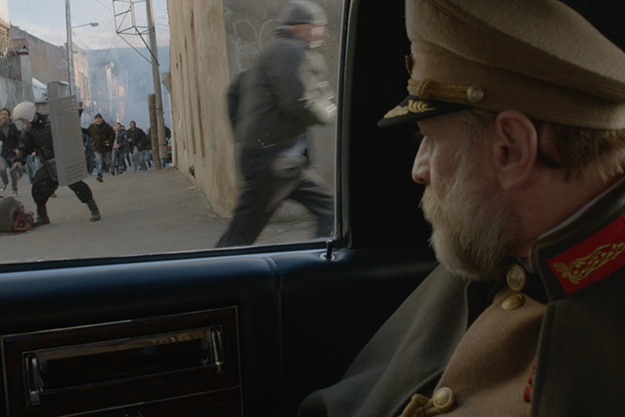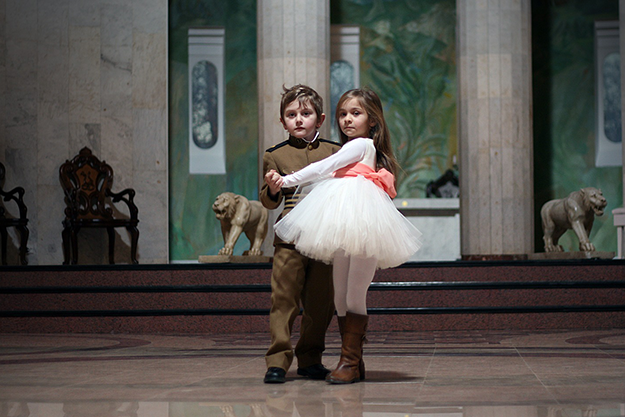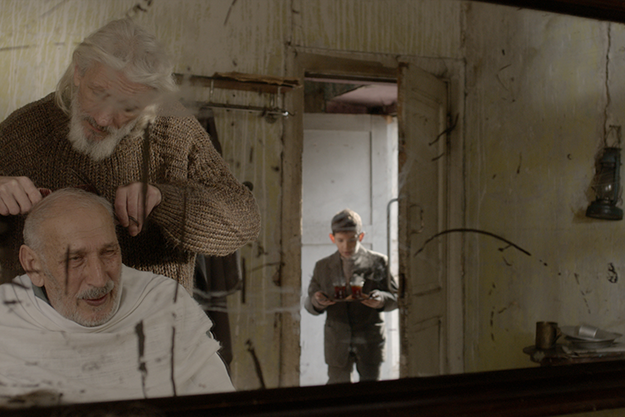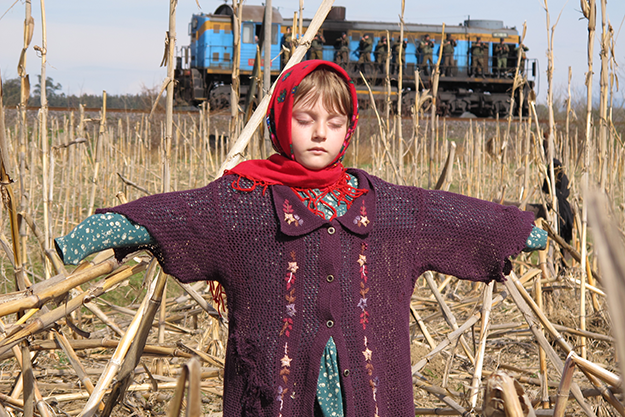Deep Focus: The President
In The President, Iranian expatriate filmmaker Mohsen Makhmalbaf struggles to create a vital fable out of a contemporary political nightmare. Set in an unnamed fictional nation state and filmed in the country of Georgia, the movie chronicles the attempted flight of a deposed tyrant (Misha Gomiashvili) and his 5-year-old heir and grandson (Dachi Orvelashvili) from longtime foes and former allies. Makhmalbaf shades the film in colors ranging from the hypnotic reds of the imperial court to the numbing omnipresent ochre of the arid wastes surrounding it. Dramatically the film is lumpy and obvious, but every now and then Makhmalbaf ignites a poetic visual surprise.
The opening sequence promises an audacious and flamboyant fairy tale. From the panoramic office window of his hilltop palace, the President demonstrates how glorious it is to be the master of all he surveys. As his very own “city of light” glitters beneath him in the evening, the despot orders the lights turned off all over town, then tells his grandson to command they be turned on again. The tyke smiles at his power to flick a switch on his entire world. He delightedly tries to repeat the trick, but this time the lights stay off. Bombs burst in the darkness. The revolution has begun.
The President reacts slowly enough for us to glimpse a ruling household that’s part Moorish alcazar and part Grand Budapest Hotel. The boy has a tiny blonde dancing partner in a tutu as well as a dance master who looks as though he stepped out of a slightly sleazy storybook. The boy is so attached to the girl that the red-coated footmen must form a moving wall to herd him into a limo with the President and his wife and daughters. While they speed off to an airstrip, one aunt accuses the other of catalyzing the rebellion with her and her husband’s cruelty and corruption. These hissing sisters provide a welcome blast of sass to a movie that desperately needs it. The President, it turns out, does not intend to leave—he thinks the uprising will pass. His wife agrees to let her grandson stay with him as long as the President monitors the lad’s blood sugar. The references to juvenile diabetes fade away in the gunfire. Saving himself and his flesh and blood becomes the President’s all-consuming goal.
Makhmalbaf has a two-stage strategy: to demonstrate the President’s latent humanity as he hides among his persecuted people, then to depict the mobs who hope to kill him as victims twice over. They’re brutalized first by the dictator’s regime and second by their own self-destructive need for revenge. It’s a humane and chastening point of view that deserves to be applauded. But it’s too tall an order for Makhmalbaf to fill in a narrative that’s packed with chases, escapes, turnarounds, and atrocities.
The movie is strongest when it tugs against its schematic design. The President is a game, tough old bird, but he boasts few survival skills: he continues to rely on any powers of intimidation he can summon while on the run. In a peak of black comedy, after having his head shaved, he berates a rural barber for not paying taxes and thus contributing to the toppling of his government. Not even an actor as full of presence as Gomiashvili can fill in the gaps between this icy brute clinging to authority and the weary old man who visits a life-battered prostitute (played by a remarkably visceral performer billed as “la Sukhitashvili”). He evinces tender remorse that he’d never received her letters, some about a sister languishing (before dying) in his prisons.
Gomiashvili and young Orvelashvili cook up a beautiful rapport, but too often it’s reduced to a kind of kid-lit call and response. The grandson is always asking his granddad to explain something scary—“What does dead mean?” or “What is a terrorist act?”—and his granddad, looking increasingly abashed as the film goes on, either evades or ignores his questions or provides strictly pragmatic answers (“When someone can’t breathe anymore, when he can’t talk, hear, or move, he’s dead”). They do share some shrewd or witty moments. The boy requests, “Wash my ass, Your Majesty.” “Everyone should wash his own ass,” his grandfather replies. “But I’ve never washed my ass,” the boy says, pleadingly. “Me neither,” admits the President.
Early on, when the President is asked to reconsider the capital punishment of a 16-year-old revolutionary, he pronounces: “If we don’t punish this kid now, later on all the kids will start a fucking revolution.” As a youthful militant against the Shah, Makhmalbaf himself was imprisoned at age 17 for stabbing a policeman. Every now and then the film does resonate with an imaginative leap born of experience. Midway through, the ragged duo begins traveling with a string of former political prisoners, some tortured so severely they can’t walk. There’s a big “reveal” about a crime that hits the President where he lives, and much debating about whether justice equals vengeance and how their society should heal its scars. But as these wounded men talk in a spirit of friendship and honesty, the grey blankets they’re each wrapped in makes them resemble holy men on a pilgrimage, and the President’s act of washing the blood from one man’s feet (they were lashed with cables) feels like a genuine act of penance.
Even the movie’s bravest strokes prove to be disappointing. It’s both grim and droll that the most credible disguise the President can come up with is “street musician.” He filches a guitar and strums it while his grandson, cloaked in female peasant’s garb, bobs and twirls. He tells the boy to regard their new life as a piece of play-acting. Unfortunately, perhaps because the expat-Iranian director is working on foreign soil in the Georgian tongue, he fails to modulate even his playful conceits. When Makhmalbaf has the President repeat that they’re role-playing, it’s as if he’s speaking straight to the audience. Makhmalbaf ties up the main action in tattered Pirandellian ribbons: when they finally reach the sea, the President tells this grandson, “the play is over.” I’ll say it is. The final minutes are a harangue performed in extremis over the hypocrisies of a makeshift political execution and a bloodthirsty notion of God’s justice.
Makhmalbaf’s previous fiction film, the far stronger yet erratic Kandahar (01), had flashes of brilliance. In Kandahar, prosthetic limbs float to the ground on parachutes, and land-mine victims hobble toward them. The scene in an international-aid station dispensing artificial legs is like a terrifying parody of service provider/customer relations. The limbs come in temporary as well as “permanent” designs that are difficult to get. But even the lucky few are rarely satisfied. Men picking them up for their wives have the additional anxiety of bringing home limbs that probably won’t fit.
In the best moments of Kandahar, Makhmalbaf conveyed every twist of irony in these savage juxtapositions. In The President, the weight of his preaching tends to flatten out the ironies and the epiphanies.
Michael Sragow is a contributing editor to FILM COMMENT and writes its Deep Focus column. He is a member of the National Society of Film Critics and the Los Angeles Film Critics Association. He also curates “The Moviegoer” at the Library of America website.











